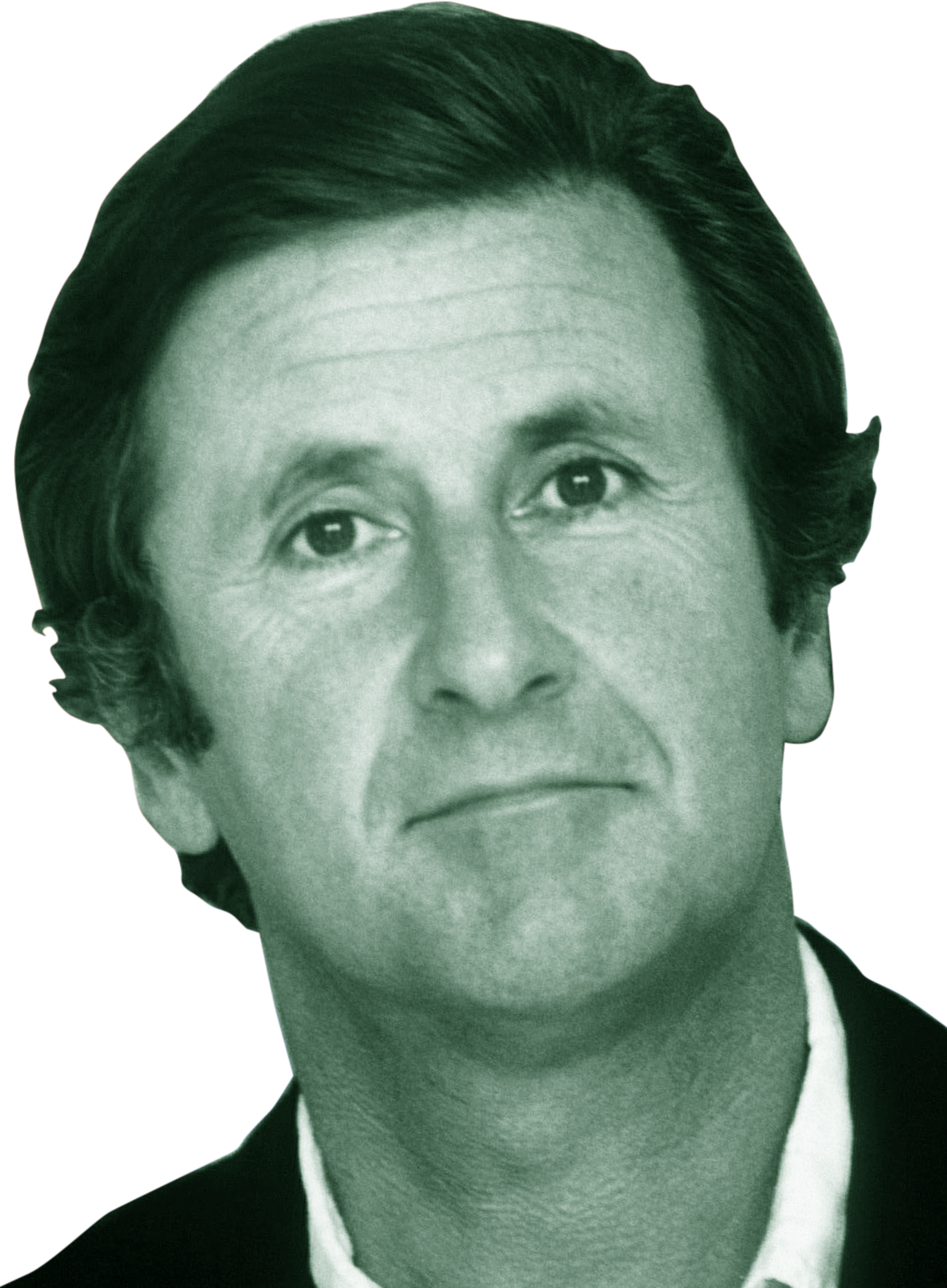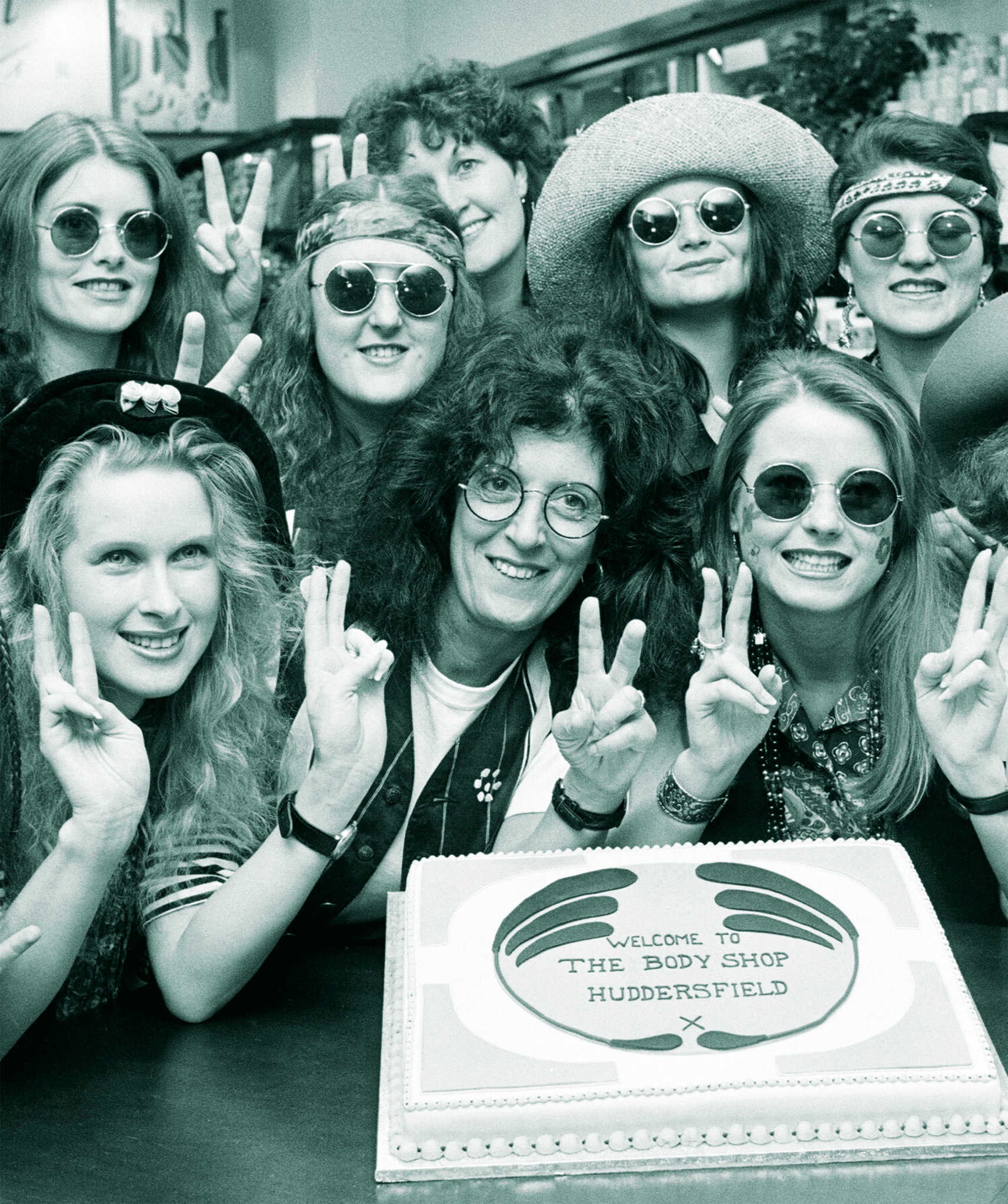
ANTI RODDICK
1942–2007
As an anti-establishment environmental crusader and champion of social issues, Anita Roddick made an unlikely cosmetics brand owner. However, the founder of The Body Shop successfully pioneered the concept of running a business ethically, while at the same time promoting the use of products made with only natural ingredients.
Born in Littlehampton, England, to Italian café owners, Anita Roddick was a strong-willed youngster who took an interest in social and environmental issues. She worked in her parents’ café until she finished her education then worked as a teacher before quitting to travel the world. On trips to Tahiti, Australia, and South Africa, Roddick learned about local customs that included washing hair with plant products and using cocoa bean fat as a body moisturizer. She was inspired by the practice of harnessing natural ingredients in this way and resolved to raise public awareness of it. Her first initiative was to open a cosmetics shop, called The Body Shop, in the seaside town of Brighton.
First store
When Roddick launched The Body Shop in 1976, she did not have large profits in mind. She hoped that the shop would merely survive by selling its line of cosmetics made from natural ingredients. Roddick planned to create a word-of-mouth buzz about her unperfumed, uncolored, and simply packaged products. Her first store was created on a shoestring, and she had no money for advertising or marketing. She painted the store dark green to hide moldy patches on the walls, and the same color remains on The Body Shop’s branding today.
The first Body Shop’s customers were encouraged to bring in their own containers to the store for product refills. “Why waste a container when you can refill it? … [In] the second World War, we reused everything, we refilled everything, and we recycled everything,” Roddick later wrote.
She had pamphlets in-store giving information about the ingredients in her cosmetics and how they were ethically sourced, and within months, The Body Shop line became popular. There were 25 products initially, including cocoa body butter moisturizer, tea tree facial oil, and banana shampoo. The range later expanded to include such items as maca root shaving cream, vitamin E skin cream, and white musk shower gel.
Roddick opened another store in 1977, and by the end of the decade, there were stores across all of Europe. Roddick’s husband, Gordon, came up with the concept of “self-financing” The Body Shop, which enabled the company to expand rapidly by franchising stores.
Roddick used her burgeoning fame to promote both her product line and her social policy. This included banning the use of ingredients tested on animals and promoting fair trade with suppliers from developing countries. She also supported other social, political, and economic causes, including protecting the rain forest, giving voting rights to all people, and providing debt relief for impoverished nations. Roddick wanted to prove that a business could be run ethically, with “moral leadership,” while still balancing the books.

Roddick outside an early Body Shop store on Oxford Street, London. She wanted her business to attract customers who were eager to buy ethically sourced and environmentally friendly products.
MILESTONES
BECOMES A DAME
Awarded the title of Dame in 2003 after being given an Order of the British Empire (OBE) in 1988.
CREATES FOUNDATION
Establishes The Body Shop Foundation in 1990 to fund animal and environmental protection groups.
GIVES GENEROUSLY
Announces that she plans to use her entire personal fortune for philanthropic purposes in 2005.
REMAINS CONSULTANT
Sells The Body Shop to L’Oréal in 2006 but still consults on ethical practices for the company.
Riches and rebukes

The Body Shop had 700 stores worldwide by 1991, and Roddick was one of the richest women in Britain. However, there was a backlash against some of her business decisions. In 1984, she had made the company public, which meant that investors could buy shares in it and the company’s success was measured in terms of profit for its shareholders. For some of The Body Shop’s customers, Roddick’s passionate support for ecological and human rights causes now seemed like a ruse for product placement. Roddick was also challenged about her fair-trade practices in 1994, which caused the share price of The Body Shop to fall. She successfully sued the makers of a TV documentary, who accused her of lying about animal testing on her products. In 1999, she was criticized for joining an anti-globalization march—an unusual stance for a company owner with 2,000 stores in 55 countries.
Roddick sold The Body Shop to French cosmetics company L’Oréal in 2006 for £652 million ($1.2 billion). She stated her intention to give most of her personal earnings from the sale to charity. Roddick also said that, despite L’Oréal’s history of testing its products on animals, The Body Shop ingredients would still be ethically sourced. Roddick stayed on as consultant to ensure that this happened.

The Body Shop’s ethos was to create ethically sourced products from fair-trade suppliers in underdeveloped countries. The company was opposed to animal testing and committed to recycling.
“If you think you’re too small to have an impact, try going to bed with a mosquito.”
Anita Roddick, 1991
GORDON RODDICK

A supporter of social and community enterprise, Gordon Roddick was a trained agricultural scientist who traveled widely before focussing on The Body Shop operations.
In 1991, Gordon Roddick (1942–) cofounded The Big Issue, a charity that aims to combat homelessness through sales of its magazine. Six years later, he established The Roddick Foundation, which offers support for people involved in social change, environmental justice, and human rights. In 2009, he cofounded 38 Degrees, a campaigning group for human rights. He also helped create The Day Chocolate Company, which makes the fair-trade chocolate Divine.
Charity campaigning
Roddick kept her word about giving her share of the profits from The Body Shop sale to worthy causes, donating sizable sums through her charitable Roddick Foundation. The foundation established Children on the Edge (COTE) to help disadvantaged children in Europe and Asia, led a campaign with Greenpeace against Exxon-Mobil for its denial that fossil fuels have an impact on climate change, and fought against the exploitation of workers in developing countries. Roddick herself became a campaigner for the Hepatitis C Trust after learning she had been infected with the disease through a blood transfusion in 1971, following the birth of her daughter.
On September 10, 2007, Roddick died from a brain hemorrhage. The capitalist campaigner who had refused to conform had given away her entire fortune—later disclosed to be approximately £51 million ($102 million)—to various charities.
L’Oréal sold The Body Shop in 2017 to the Brazilian cosmetics company Natura for £860 million ($1.11 billion). In 2019, The Body Shop received a B-Corp certification, awarded to for-profit companies considered to adhere to social, environmental, and sustainable standards.
“If you do things well, do them better. Be daring, be first, be different, be just.”
Anita Roddick, 1999

▲ Roddick (center) marks the opening of a new branch of her chain in Huddersfield, UK, July 10, 1992.
